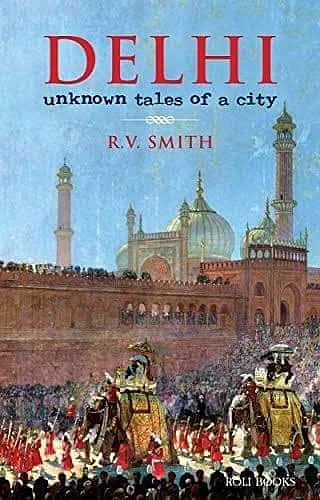He knew Delhi like back of his hand: A tribute to RV Smith, noted author and the city’s finest chronicler
Noted author, historian and the finest chronicler of Delhi, RV Smith passed away on April 30 morning in the national capital at the age of 83

Noted author, historian and the finest chronicler of Delhi, RV Smith passed away on April 30 morning in the national capital at the age of 83. The true chronicler of Delhi was the recipient of the Canon Holland Prize and The Rotary Award for general knowledge and journalism (1997-98) from the Michael Madhusudan Academy. It is said no one knew Delhi better than Meer, Ghalib and RV Smith.
To say that he knew the winding lanes, bylanes, gullies and koochas, little known monuments and gardens and parks and haunting houses to Havelis of Delhi like the back of his hand and lines on his palms, won’t be an exaggeration. Such an iconic raconteur and guide of Delhi he was, but to our surprise he was not originally from Delhi, yet Delhi became his breath and sport, bread and butter and lifeline. As Meer writes in his couplet, “Dilli ke na koonche the, aur na musafir the, jo shakl nazaraayi, tasveer nazar aayi.”(Delhi streets were not allies, but parchment of a painting.

Every face that appeared seemed like a masterpiece), RV Smith painted Delhi layer by layer, thread by thread over five decades of his career as a journalist and writer. His weekly columns in The Statesman ‘Quaint Corner’ and in The Hindu ‘Down Memory Lane’ were the readers’ first choice for many years. Author Rakshanda Jalil, says “He was very fond of food. He could recall flavours, tastes and textures. He remembered the minute details of the gulleys and mohallas of Delhi, and that set him apart.
There was always an anecdote, a qissa on his fingertips that he would recall from memory. He was, in true sense, a flaneur. He discovered the city by walking around; his feet have discovered Delhi. He was not very tech savvy and continued writing on his typewriter. He would have to go to an internet café to open an email.”
Author, food connoisseur, qissago (storyteller), RV Smith donned many hats in his lifetime. Born in Agra in 1938, RV Smith made Delhi his second home and was recognised as the city’s greatest chronicler. He was a descendant of Col Salvador Smith (1783-1871), the soldier who trained the troops of Daulat Rao Scindia. His father was Thomas Smith, a noted journalist. After graduating in English literature in Agra’s St. John’s College, Smith came to Delhi in the 1950s and started working at the Press Trust of India in 1961. Two years later, he joined The Statesman and retired as news editor in 1997.
He also freelanced for several publications and wrote weekly columns. His graphic descriptions of places and their history are interspersed with local folklore and unusual stories, his books are unique and they still continue to haunt their readers. He authored 12 books and his last publication was ‘Delhi’s Curly Tales’, published last year in December.
“I keep my eyes and ears open wherever I happen to be, for I always write what I have personally experienced”, he used to say “Writing to me is recalling incidents and bazaar scenes or things noticed in the surroundings of old monuments”, he had added.
Unlike other celebrated writers on Delhi, he remained as invisible as the people and places he wrote about. He was rarely spotted at book launches. In the Sunday service at Mayapuri’s St. John De Britto Church, he would always be seen sitting timidly in the last row. Like many Dilliwallas, RV Smith had no permanent home in the city. He lived in cheap hotels that surround the Jama Masjid to this day.
This semi-nomadic existence enabled him to explore the Walled City like an insider : his archetypal street-side stories are the stuff that today’s flaneurs dream of. “First, I moved to Naaz Hotel, where I stayed in the room that was earlier occupied by (painter) M F Hussain when he lived in Old Delhi”, in one of many interviews given to the another Dilliwalla flaneur Mayank Austen Soofi, Smith had said, “I later shifted with my wife to Azad Hind Hotel, where my son Tony was born. We ate most of our meals at Karim’s. In the evenings, we sat on Jama Masjid’s stairs, where we would have seekh kebabs.”
“Like many real writers of our times Smith sahib too had a hard life towards the end of his years; some of that hardship could have been alleviated if there were some help from a government agency none of which was forthcoming. I know this because I tried”, remarks Rakshanda Jalil.
Follow us on: Facebook, Twitter, Google News, Instagram
Join our official telegram channel (@nationalherald) and stay updated with the latest headlines